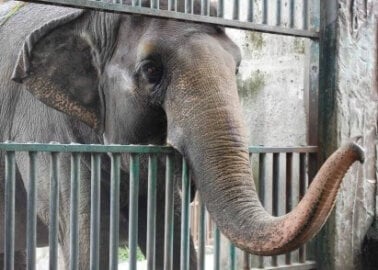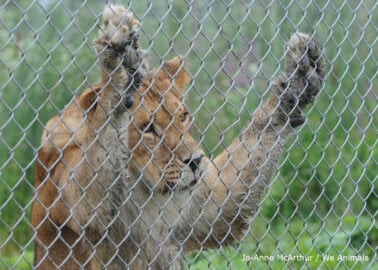11 Things We Learned From ‘Should We Close Our Zoos?’ on BBC’s ‘Horizon’
Last night, an eye-opening Horizon documentary on BBC Two asked, “Should we close our zoos?” Speaking to experts from around the world, the programme addressed issues such as the welfare of captive animals, the shocking “culling” of healthy animals and the “conservation con” that many zoos use to justify their existence.
The filmmakers spoke to experts on both sides of the debate – but by the end, it became increasingly clear that the answer to the question about whether zoos should be closed down is “YES!”
Here are some of the most striking facts that emerged:
1. Between 3,000 and 5,000 healthy “surplus” animals are “culled” (ie, killed) by European zoos each year.
Remember when everyone was outraged after Copenhagen Zoo killed Marius the giraffe and dissected him in front of children? Poor Marius was just the tip of the iceberg.
2. More than 90 per cent of the species kept by zoos are not endangered in the wild.
If you think zoos are mainly about conservation, you’re wrong.
3. Zoos haven’t changed as much as they’d like us to think.
Most of them still exhibit the same big “showy” animals, such as elephants and big cats, as they did in the 1820s – despite growing scientific evidence that these animals’ welfare needs can never be adequately met in captivity.
4. On average, elephants in zoos live only half as long as wild elephants.
Scientists believe that stress and obesity are the main causes of this shocking statistic. Captive elephants also frequently suffer from painful arthritis and foot conditions as a result of being kept on concrete floors and denied the chance to roam.
5. Most zoos are resistant to improving conditions.
When the Detroit Zoo in the US decided to move the elephants to a sanctuary, it faced backlash from the wider zoo industry. And zoos’ reactions to studies showing how animals suffer in captivity have been described as “negative and hostile”.
6. A study has found that around 80 per cent of carnivores engage in stereotypic behaviour in captivity.
This abnormal and repetitive behaviour, such as pacing and head shaking, serves no useful purpose, and it’s hardly ever seen in the wild. Scientists believe it reflects psychological damage.
7. SeaWorld still won’t admit that captivity is harmful to orcas, despite a wealth of research.
When asked for scientific evidence for the company’s claims, the marine park’s chief veterinarian could only cite “experiential evidence”.
8. Only a tiny 3 per cent of British zoos’ expenditure goes towards conservation projects in the field.
And that money is failing to have any real impact on conserving species.
9. Zoos’ claim that using animals as “ambassadors” helps with conservation efforts doesn’t hold up.
“There’s no evidence that seeing animals in zoos changes people’s opinion”, one expert said.
10. Around 400 pandas have been bred in captivity, but only five have ever been released – and only three of those survived.
Even though millions of pounds are being spent on efforts to reintroduce pandas into the wild, these efforts are unsustainable as long as the animals’ habitat continues to be destroyed.
11. Zoos’ captive-breeding programmes generally don’t work and send the wrong message.
Zoos have failed to save even the most “charismatic” animals, such as the great white rhino, from extinction (there are now only three of these rhinos left in the world). And they offer false hope that science can “clean up the mess” caused by humanity’s wide-scale environmental damage, distracting us from making meaningful change that will really help animals, wild or otherwise.
The programme is available on BBC iPlayer for the next 29 days, so if you didn’t catch it the first time, check it out and let us know what you think by leaving a comment below.
Of course, compassionate people have known for a long time that keeping animals locked up for human entertainment can never be ethical. And, as the campaign against SeaWorld shows, public opinion is shifting, and more and more people are realising that keeping intelligent, sensitive animals behind bars is wrong.
Be part of the movement – please boycott zoos and marine parks!



